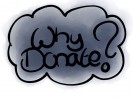Here’s a thing you hear a lot from anti-choicers: Pro-choices don’t care about women. You see, they’ve heard stories from women who had abortions- or maybe even had one themselves. Those women feel immense regret, guilt and heartbreak over what they did. Their abortions were traumatic. How can pro-choice people be so heartless as to encourage others to do something that hurt them so much?
It’s a good question. It’s a difficult one to look at. It’s also easy for us as pro-choice activists to view it as disengenuous. I know plenty people who have no regrets over their abortions. I’ve heard the other stories. The ones where women remember their abortions as a positive decision.
But if we’re going to be intellectually honest, I think we need to take on the idea of abortion regret. Head on. So let’s take a look at it.
Some people regret their abortions.
This is true. I wish it weren’t so- it must be heartbreaking to know that you made the wrong decision on something so important.
Everybody has regrets. Nobody gets through their lives without making a decision that they wish they hadn’t. I can think of dozens of things that I wish I’d done differently, from the simple (if only I had studied this instead of that. If only I hadn’t wolfed down my lunch today because oh god you can’t die of indigestion can you?) to the almost unbearable.
On one hand, it seems like it would be wonderful to protect people from the pain of regret. Who wouldn’t like a chance to take a time machine to a version of themselves twenty years younger?
Of course, none of us will ever get that chance. We never know for certain if we will regret something, or look back on it with relief. We weigh up our options and we do the best that we can.
Yes, there are people who regret having abortions, and whose hearts will always be a little broken by their decisions. There are also people- although it’s even harder for them to share their story- who know that the decision to have children was a mistake. And there are people who have made either choice who know that it was the right thing to do.
Why might people regret abortions? How can we prevent this?
To be pro choice is to acknowledge one principle: that we are the people most qualified to make decisions about our bodies and lives. And yet, we know that none of our decisions are made in a vacuum. Our life circumstances play a role. So do our own biases. These affect not only the decisions we make, but also how we feel about them. So let’s look at why people might have abortions that they regretted, and see if there’s anything they we can do about it. (Spoilers: there is)
What choice?
I have something in common with anti-choicers. Neither of us want anyone to feel forced into abortion.
You see, pro-choice is not pro-abortion. Not specifically, anyway. We can say this without disparaging abortion. Let me be clear: I think that abortion should be safe, legal, freely available and rare happen precisely as often as it needs to. If that means it is rare? Great. If that means that every pregnant person has a dozen? Great. That is infinitely preferable to everyone having a handful of children they never wanted.
But pro-choice is not about abortion. We don’t advocate for abortion rights because the procedure is special. We do so because it is both necessary and denied. Ireland’s constitution states clearly that it is perfectly acceptable to force a pregnant person to become a parent against their will. I disagree.
And yet even in Ireland many people terminate pregnancies that they would have loved to continue. No wonder they have regrets. And no wonder it happens. Parenthood is an immense commitment, and it’s one that we expect people to do with little support. We act like love is enough- but all the love in the world doesn’t put food on the table. It doesn’t clothe a child, or buy their schoolbooks. And it definitely doesn’t give a parent the ability to be in two places at once. Becoming a parent is always going to require commitment and devotion. All too often, it also means giving up on your own life. No wonder people feel like they don’t have a choice.
Of course, there is a solution to this. It’s a simple one, but it’s not easy. If we don’t want people to have to terminate wanted pregnancies, we have to support parents and children. We need to give parents the financial support they need to provide for their children. We need affordable, accessible daycare facilities so that people- mostly women- don’t have to choose between parenthood and education or a fulfilling career. We need adequate parental leave. We need to create a culture where parents of all genders are encouraged to take an equal role in raising children.
Shame and Regret
I read a story recently. A woman, talking about an abortion that she had when she was younger. She said that she could never tell her family about what she had done. But the reason for her termination? Her family would have disowned her if they knew she was pregnant in the first place.
I’m not sure how she felt about her decision. But let’s imagine that she regretted it. I’m sure people in that situation have.
If we want to prevent this? We need to never, ever shame people for being pregnant. Or for being mothers too young (or too poor, or too single). The idea that there is only one respectable way to parent is toxic. It doesn’t prevent pregnancies- for that you need contraception, which people are far less likely to use if they are shamed. All it does is make life more difficult for people parenting in different situations. And makes it far more likely that people who might have wanted to have a kid will feel pressure to terminate. Often from the same people who would call them murderers if they heard about what they’d done.
If you want people not to do a thing? You have to make the alternative feel possible.
Regret Happens
Let’s picture a more ideal world. In this world, pregnant people and parents are supported unconditionally. The best reproductive medical care is freely available. Parents have all the supports they need from the moment their child is born. Parental leave is generous and fully-paid. Daycare is the best quality, easily affordable, heavily subsidised for low-income parents, and easy to get to no matter where you work or study. As well as this? Everyone’s grown up with fantastic sex and relationships education. The society has gotten over its hangups about sex and pregnancy. And any kind of birth control that you might want is free and accessible.
(Aside: I want to live in that world. Now, please.)
That world, by the way, is one that people on all sides of the abortion-rights spectrum should be gunning for. And if you’re not? Then I’m really not sure why you’re here.
Even in that world, some people will make decisions they regret. It’ll happen less, of course. But humans are profoundly imperfect. Sometimes we mess up. We never act with perfect information. There are always things that we don’t know.
There will always be regrets. And you know something? That’s okay.
In every other area of life, we acknowledge that people don’t always have to be perfect. None of us gets through life without making mistakes sometimes. And even when we did the best we could and things worked out wonderfully, there’ll always be a small part of us that wonders what could have been. We understand this, don’t we?
With the right to make our own choices, will some people wish they chose differently? Of course. Will that ever be worth taking those choices away from us? Never.
Even bloggers have to pay the bills! Monthly subscriptions- no matter how small- help give me the security to devote time to this place and keep a roof over my head. If you like what you read, please do help out:





